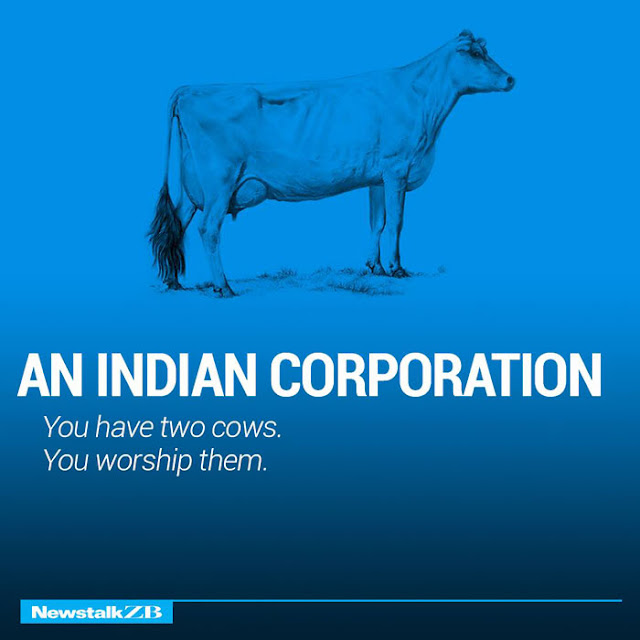Timely meditations: Indians and their cows
The cow cartoons explaining politics has now been greatly expanded (see the impressive range here) and an Indian version has become available. The joke, however, is timely, though slightly misdirected: The title should have been Indian ideology, rather than Indian corporation. [Indian corporation version, if one must try, would be - you have two cows. You outsource them. You buy back their half-diluted milk 25% cheaper. But then you build a dozen flats where the barn used to be.]
A lot of people ask me whether Indians really worship the cows. While the fact that Hindus don't eat beef was well-known, the recent news about cow vigilantism and cow-urine retail packs have brought the question to the fore. And, also, the other aspect of this debate is Hindu/ Indian distinction. Some parents in a local primary school petitioned 'Indians don't eat beef' and almost convinced everyone, until more enthusiastic ones tried to take this one step further - Indians don't eat meat, they said - for the whole idea to unravel.
Since Prime Minister Modi's government has come to power in India, cows have been in headline news. The consumption of beef, already a taboo in many states, has been banned in many other states, including in Jammu and Kashmir, the only state in India where Muslims are a majority. Buffalo meat was, ironically, one of the key export commodities from India, where the country had a technological advantage, but it stalled in the face of political uncertainty (See this story from The Economist). Various Indian state governments passed legislation restricting cattle sales and slaughter, and cow-vigilantism became headline news as it spread across the country and Ministers provided it tacit support by remaining silent in the face of lynching and burning of people accused of eating ot storing beef (or buying or selling cattle).
So, what about Hindus and the cows? Is it a sacred animal and why? When we know that the ancient Hindus did eat beef and sacrificed Oxen at festivals, why is it a big issue for today's Hinduvta warriors? It is worth exploring the back story, both genetic and religious, to understand the connection. However, at the outset, this is not an attempt at justification of the modern politics of the cows, which, as I hope the following paragraphs would show, is based on a profound but deliberate misinterpretation of the Hindu tradition.
Genetic evidence points to all existing cows originating from a single herd of wild Oxen in ancient Persia (see the story) and while many still debate about exact time of its domestication, we know of domesticated cows in the Indus valley about 8,000 years ago. That makes cows an early breed to be domesticated, and humped cow, in particular, a South Asian domestic animal of choice.
 |
| Source: Science News |
The lactose tolerance, a mutation that came with domesticated cows and something proved to be an evolutionary advantage as this was an easy source of nutrition, followed the same path out of Persia. It seems that this mutation moved from Persia to Europe (and is considered as one of the possible sources of European advantage) but also to India (see this report). It seems that the 'Aryans' brought cows and lactose tolerance to India, because most Indians in South and East India show less lactose tolerance than the North Indians. As the Aryans, who seemed to have been cow-herders, interacted with the settled farming communities in India, they brought the cow into the culture. In that sense, the ancient Indians and cows co-evolved together, and built bonds as deep as Central Asian or Middle Eastern tribes and their horses.
This brings us to the figure of cow (and Ox) in Hindu culture. For the Hindu texts, such as the epic Mahabharata, the cow is the symbol of the Earth while the Ox is the symbol of 'dharma', or duty. The earth, like the cow, is milked for sustenance - and as the giver of sustenance, one is to look after the mother earth (and the cow, as its symbol). This symbolism may have a material origin and arisen from the deep connections between the Aryans and their cows, but cows stood for an attitude of 'care', a commitment to nature, as Hinduism spread to other parts of India where cows were relatively new imports. Indeed, cows provided poor agricultural families a whole energy system, nutrition through milk and fuel through cow-dung, while Oxen were used in tilling the land. It is not difficult to guess why a community would want to discourage the slaughter of its cows for their meat when it was so integral to its existence.
So, yes, the Indian ideology is to build a life around two cows and be satisfied with it. Now, that's not what the current leader's political line is. For a start, the above-mentioned genetic lineage would be an anathema to him. The alien origin of the cows wouldn't sit well in the environment when everything has to be made in India to be acceptable. Besides, his complete disregard for the environment shows a superficial understanding of the Hindu tradition - taking the 'cow' literally rather than appreciating what it meant.
However, on the other hand, the 'liberal' disregard for the ideology of cows is also based on similar ignorance, and an arrogance to live outside history and tradition. It is important for the Indian liberals to understand the significance of cows in Indian culture (while Indian and Hindu are not equal, Hindus are a majority of the Indian people) and be more circumspect about dismissing sentiments about cattle as uneducated naivety. And, indeed, eating beef may not be progress in India; it may just stand for environmental vandalism.


Comments